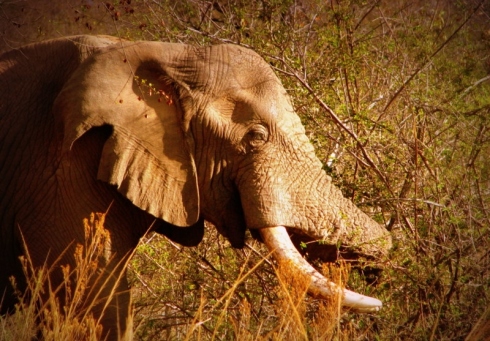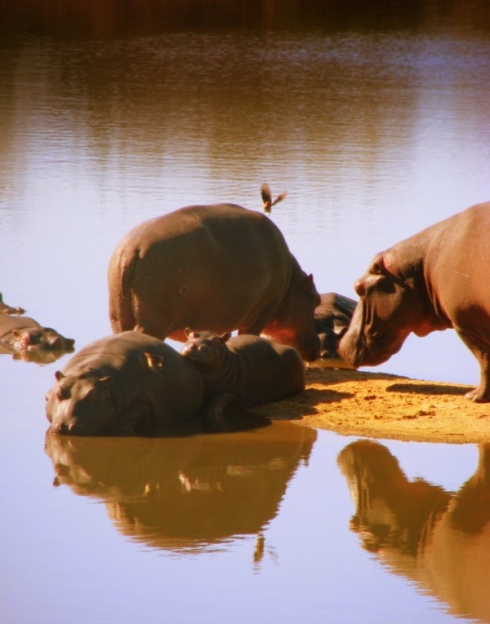With Africa looking to grow as a continent, governments are utilising any resource at their disposal. Controversially this has included using the region’s natural resources and business connected to Africa’s ecology is booming. Africa’s mineral wealth has long been the focus of businesses and governments. Resources, such as diamonds, oil, colbalt, gold etc have all boosted the economies of Africa. However, they come at an environmental and ecological cost. The recent threat to Virunga National Park, Democratic Republic of the Congo, from oil exploration has once again opened the debate about how much is Africa’s ecology worth?
However, in the this article, I don’t want to explore the issues surrounding mining, forestry etc. Instead I want to focus on Africa’s economic exploitation of its wildlife. Can industries, such as the ivory trade, legalised game hunting or even tourism be ethically justifiable?
Ivory: Can Legal Sales Ever Be Justified?
Ivory is big business in Africa with increasingly high numbers of elephants being poached by individuals desperate to make a profit out of this valuable commodity. It has become such a successful industry that the governments of Africa have sought to legalise the sale of stockpiled ivory.
Ivory trading was banned in 1989 by CITES (Convention on International Trade in Endangered Species of Wild Fauna and Flora) in a bid to protect the elephant population in Africa. However, since the ban there have been frequent calls for African nations to legally sell their ivory reserves.
Pressure came from South Africa and Zimbabwe to allow a sale of ivory and in 1999 CITES allowed an experimental sale of ivory from Botswana, Zimbabwe and Namibia to Japan. Subsequent stocks of ivory were legalised for sale in 2002 and in 2008 another ‘one-off’ sale was announced, with 108 tonnes of ivory being shipped to China and Japan. Despite these sales being approved by CITES, with assurances about the origins of stocks and the destination of the product, the sales caused huge controversy worldwide:
- Many individuals and groups claimed that the sales would create or develop a market in East Asia for ivory by increasing the supply.
- It was believed that poaching increased rapidly as a result of the sale. It was thought individuals would want to be part of the growing industry and likely undercut the prices offered by government sellers.
- Others argued that one-off sales were a slippery slope towards the potential farming of elephants for ivory.
However, opinions vary hugely over the implications of the legal sales. Several writers, such as Mary Rice, have asserted that the legal sales undermined the conservation efforts of organisations, such as WWF, in protecting elephants populations. She attributes the rapid rise in poaching to the first one-off sale approved by CITES. However, others say that the rise in poaching is not the fault of those at the industry’s origins. Instead they claim that China, Japan and other Asian markets for ivory are behind the rapid increase. China, in particular, has been growing as a ‘middle-class’ economy and as China’s wealth grows so to does the demand for luxury, ‘status-symbol’ products such as ivory.
With ambiguity over the results of the ivory trade, the issue has switched to ethical question over whether African nations should be able to make money off of their wildlife?
The governments argue that a sale of their stockpiled ivory (collected from dead elephants, historic stocks of ivory and seizures of illegal stocks) would be of huge economic benefit to nations struggling with extreme poverty, and they bulk at Western nations dictating how they should develop and manage their economies.
However, for many the trade in ivory (no matter whether it’s legal or not) is ethically wrong. People question why we should benefit off the death of animals, in particular threatened animals, for aesthetic purposes. By legalising sales of ivory stockpiles environmentalists argue that we are effectively condoning the actions of poachers and their exploitation of animals for profit.
Ambiguity remains over the sale of ivory. It is an emotive issue that can generate media headlines around the world. Poaching is clearly on the increase and whilst this remains an issue for the global community focus will remain on whether Africa’s economies should benefit from the sale of this globally valued product.

(Above: Elephants are the iconic African animal and under greatest threat from Africa’s growing economy) Photo: Penny Banham // A Changing Wild World
Game Hunting and the Tourist Industry
Although animal parts, such as ivory and rhino horn, are a big business in Africa both the legal hunting and wildlife tourism industries are key to modern African growth. But both trigger controversy.
Hunting has long been an important industry for African nations and during the colonial period it was big game hunting that drew visitors to Africa rather than the ubiquitous safari holidays we see today. But when the threat to Africa’s wildlife became to great, strict restrictions were put in place over the legality of hunting. Certain species were protected by international laws and where hunting remained legal limits were put in place. However, hunting never truly ended in Africa and increasingly governments and the national parks themselves are seeing it as a way to increase their earnings. Often hunting is used as a method of population control within the national parks. Animal euthanasia is often seen as a costly and labour intensive undertaking and by using hunting they earn money as a by-product of a necessary activity.
Despite the economic benefits from hunting, environmentalists have declared the legal hunting of big game barbaric and unnecessary. They criticise the parks and governments, arguing that it robs the animals of their dignity and treats the ‘protected’ wildlife as commodities.
Although hunting generally is condemned by the international community, safari tourism is generally seen as a positive influence on the African economy and ecology. But is it as positive as it has been portrayed?
Ultimately yes, safari and wildlife tourism has been one of the biggest benefits to the African economy. Without the money generated by tourists, the conservation and protection of the continent’s wildlife would be non-existent. The tourists drive the growth of the local economy and therefore fund the national parks and organisations that protect Africa’s wildlife. Yet tourism can have a negative impact on the ecology of the region. As with any environment, tourism can put a great strain on the infrastructure. Intensive tourism can threaten the everyday behaviour of wildlife, cause damage to the environment through erosion and drain the resources of the area. These factors combined could seriously damage the African ecology if handled unsustainably.

(Above: Hippos are a key part of Africa’s rich wildlife that draws tourists to places such as Karongwe, South Africa) Photo: Penny Banham // A Changing Wild World
Africa’s Ethical Dilemma
Africa has struggled to justify its economic exploitation of its natural resources. Many practices, such as the trade in ivory, rhino horn and legal game hunting have been internationally condemned and although there are conditions in which nations have condoned these trades, often the ethical price has been too great. Africa’s elephants are among many of the animals that are facing increasing threats and despite government’s seeking to legalise controversial trades, calls for conservation and wildlife protection are also growing.
CITES, WWF and other organisations will continue to fight for conservation but with Africa continuing to develop economically it is clear that the ecology, natural resources and wildlife all have an monetary value that African governments will consider when developing their national economies. The focus for all parties involved is that any economic benefit, derive from Africa’s ecology, will come at the smallest cost to the wildlife of Africa.
By Peter Banham
See Also:
Legal Ivory Trading Severely Undermines Elephant Conservation // The Ecologist
When You Ban the Sale of Ivory, You Ban Elephants // CATO Institute
Virunga Under Threat: Gorillas, Oil & the Congo // A Changing Wild World



